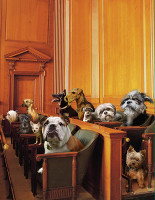
The use of sniffer dogs in criminal court has to be among the most bizarre trends yet to sweep across modern jurisprudence. In some cases, judges have virtually handed their authority over to dogs, allowing police to conduct unwarranted searches based on an officer’s interpretation of their loyal K9’s nuanced behavior.
A 9th Circuit Court of Appeals decision published this month bucked the trend toward letting dogs make judicial decisions. Jurors must be allowed to know how many times a dog got it wrong, the court concluded.
The 9th Circuit decision comes on the heals of several decisions that have paved the way to let police dogs hold court during roadside traffic stops.
In 2005 the Supreme Court ruled a drug dog’s alert comprises probable cause to search the interior of a vehicle. Police need not bother asking a judge for warrant – their dogs have that covered. Then, in a Supreme Court case argued on Halloween, 2012, the court concluded that a dog’s behavior is sufficient cause for an unwarranted search even when the dog gets it wrong. And get it wrong, they do.
The Chicago Tribune in 2011 reported more than half of searches conducted based on the authority of a dog and its police handler found no drugs – except when the subjects were Latino. Police found no drugs on three out of four Latinos that police dogs accused of drug possession.
Forbes Magazine called the court’s decision to let police seize unrelated evidence based on a dog’s incorrect allegation of contraband “one of the truly more whimsical pronouncements in Supreme Court history.”
“The question—similar to every inquiry into probable cause—is whether all the facts surrounding a dog’s alert, viewed through the lens of common sense, would make a reasonably prudent person think that a search would reveal contraband or evidence of a crime. A sniff is up to snuff when it meets that test,” the court wrote in Florida v. Harris 133 S.Ct. 1050 (2013).
Detective Dogs: Reasonable? Prudent?
Whether a reasonably prudent person would believe a dog’s behavior reflects anything other than the handler’s cues might depend on how well read the person may be.
An Auburn University professor who researches police dogs told the online publication RawStory.com a handler can trigger false positives by circling a search target too often, walking a dog too slowly through a search or providing a subtle cue about what is expected of the dog.
A former police-dog handler told Raw Story that dogs alerted to 46 out of 50 cars during a review he was paid to conduct, but only 6 of the cars were found to have drugs inside. That’s a false positive rate in excess of 85 percent.
A University of California Davis study published in the January, 2011 edition of Animal Cognition found that dogs produced significantly more false-positive alerts when their handlers believed there was contraband in the room. The Australian government reported in 2011 that as many as 80 percent of searches prompted by a drug dog’s alert found no drugs.
The 9th Circuit case (Aguilar v. Woodford, D.C. No.2:06-cv-00554-DOC-MAN) involves a different form of police dog evidence than the widely used sniff evidence introduced in drug cases. In that California case, a dog was asked to identify a man suspected of murder. The man’s conviction was based on police testimony that the dog’s alert indicated a scent from a car seat where the shooter sat matched the defendant’s scent. The sniff tests were conducted a month after the shooting.
The only other significant evidence in the case was ambiguous eyewitness testimony that didn’t match what those witnesses originally told police. Prosecutors failed to investigate another suspect who witnesses allege had a reason to commit the murder and who was seen chasing toward the victim shortly before the killing.
The dog had a record of making mistakes. Defense attorneys requested documentation of the dog’s history. The dog’s evidence had been tossed out in two previous trials because of a pattern of false identifications. “There is no doubt (dog) Reilly’s history of making erroneous scent identifications is exculpatory evidence,” Judge William Fletcher wrote in the 9th Circuit’s ruling.
A defense attorney in other trials where the dogs handler testified had formally advised prosecutors that defense teams have a right in future trials to know about the dog’s track record. The prosecutors failed to advise defense attorneys of the dog’s dismal record, which included misidentifying a prison inmate as a suspect in a killing that occurred while the man was still in prison. That’s something a jury needs to know, the 9th Circuit concluded.
Prosecutors had earlier argued the state appeals court could not presume the prosecutions’ trail attorneys knew of the exculpatory evidence provided to their office. “For good reason the State has not made this argument to us,” Fletcher wrote for the 9th Circuit.
The good reason was that the dog’s handler knew about the dog’s prior performance. Whether the prosecutions trial attorneys were hasty in preparing the dog handler as a witness, or the handler deliberately concealed his dog’s record, the prosecution was nonetheless obligated to discover and share exculpatory evidence with defense attorneys, the court stated.
Justice Not Entirely Gone to the Dogs
Sniffer dogs tendency to err doesn’t mean they can’t be fine public servants. When a bloodhound chasing a fugitive gets lost chasing rabbits instead, there’s basically no harm and no foul. The dog’s mistaken interests don’t affect the outcome of a criminal trial. If a cadaver dog falsely alerts to clothing in a pile of post-disaster debris, nobody is harmed by the dogs’ less-than-perfect performance. When dog’s behavior effectively becomes evidence in a major criminal trail, it’s a different story.
Rules governing criminal procedures all across the nation require that prosecutors release “Brady” material – any information in possession of prosecutors or government agencies that might cast doubt on allegations against the defendant. The California prosecutors’ failure to reveal the dog’s past mistakes comprised what we call a “Brady violation.”
Likewise, the state’s failure to act on a defense attorney’s recent assertion that the dog’s mistakes should be reported to any attorney defending clients against the dog’s K9 testimony prejudiced the court that was deciding the future of a then 20-year-old California man. For that reason, a federal appeals court tossed out his conviction and the life sentence.
The July 9th Circuit decision offers a glimmer of hope that justice has not entirely gone to the dogs. Another decision handed down from the U.S. Supreme Court this year established that police can’t use a drug dog’s behavior as pretext to get a search warrant for a persons residence. That Supreme Court decision implies different Constitutional rules govern searches of private residences than those that permit dog searches on public roadways.
Strategy Session: Tulsa Criminal Defense Attorney
If you’re accused of a crime and police used animals to gather evidence against you, you have a right to know if the animals are qualified investigators. If the evidence was not properly gathered, or is not reliable, an attorney may file a motion to suppress. If prosecutors can’t prove their case based on reliable evidence lawfully gathered, you may be acquitted, or have charges thrown out.
Don’t take chances when your future is on the line and dogs are used to gather evidence. Contact a Tulsa criminal defense attorney at Wirth Law Office. For an initial strategy consultation, call today at 1 (918) 879-1681 or toll free at 1(888) Wirth-Law. If you prefer written correspondence, you may submit a question through the form at the top right of this page.consultation about your rights.
More Drug Dog (Un)Reliability Resources:
- Florida Supreme Court Opinion: Drug Dog Training Information, Field Records Required for Probable Cause to Search Vehicle
- Huffington Post: Bad Cops Use Drug Dogs to Game Forfeiture Laws
- Huffington Post: Illinois Drug Dogs’ Error Rate 28-74 Percent
- Nevada Troopers’ Lawsuit Says Drug Dogs Trained as “Trick Ponies” to Give False Alerts
- National Association of Criminal Defense Lawyers: Police K9s and the Constitution – What Every Lawyer and Judge Should Know


